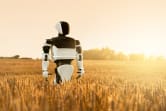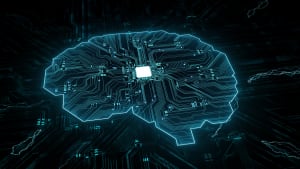AI is revolutionizing the food industry, and OU kosher-certified companies are at the forefront of this transformation. Two such companies have recently adopted AI to enhance their products and streamline their operations. Coca-Cola, for example, leveraged AI-driven data analysis on consumer behavior at fountain soda machines. They found that customers frequently mixed cherry soda with Sprite, leading to the inspired creation of a new product: Cherry Sprite. Meanwhile, Kraft Heinz is utilizing AI to optimize personnel management and communications. Beyond these examples, AI is also empowering farmers with essential crop data and aiding in the calculation of product shelf life.
Smart Farming

Internet of Things, as a drone, and Machine Learning combining to give the farmer quick and precise information.
With the combination of Internet of Things (IoT) and Machine Learning (ML) that exist under the AI umbrella, agricultural farming has taken on a new dynamic. Consider the Internet of Things as objects like drones and in-soil apparatuses that sensors are attached to. Think of Machine Learning as the analysis of the data that is sent to a device by those things. This model delivers instant crop information to the farmer.
The drones and apparatuses in the soil track the weather, moisture of the soil and crop growth. Based on the data farmers can know the best time to start planting and what kind of harvest to expect. This allows them to predict what profits will look like and how to plant for the future. Besides data points to assess the crops, farmers are now using robots to pick the produce from the farm. This cuts down on labor costs and brings greater efficiency.
New Tastes and Textures
Coca-Cola and OU kosher-certified Ingredion are prime examples of how far AI is revolutionizing the food industry. Coca-Cola introduced a new soda, Cherry Sprite, based on AI using algorithms to study the practices of how people mixed sodas at fountain machines. The data pointed to a prevalence of consumers mixing cherry soda with Sprite. This produced a new product, and producing popular products represent the lifeline for food and beverage companies.
Ingredion is a huge food company that supplies ingredients to major companies all over the world. They now have AI programmed robots that are performing different texture assessments. Tony DeLio, who was the senior vice president of corporate strategy and innovation for Ingredion at the time, said, “We can link in more of the sensory stuff with the rheological data so that we can start to predict an optimized texture for, say, a yogurt product. And if someone wants to mimic this sort of texture, we can go in and, through our system, pretty accurately define an ingredient solution that gets you to that texture.”
But will machines be able to taste? Tim Joyce, a Principal at the consulting firm of ZS Associates, believes it can happen. He said, “What’s really going to break this wide open over the next decade is developing sensors that can actually taste food products in lieu of a human being and predict how a human is going to receive that multi-sensory experience.”
AI is also benefiting food companies by being able to predict consumer trends in a matter of seconds. No longer are large case studies required to arrive at what consumers desire. Now, once data on purchasing habits of consumers are collected future trends can be easily identified.
Predicting Shelf Life
Food waste is a global problem and especially plagues the US. The current estimate is that about $218 billion is wasted on a yearly basis. There are new companies that are aimed at trying to tackle this problem. Neolithics, an Israeli-based AI company, has developed technology that can monitor shelf life, thus avoiding unnecessary discarding of food. Using powerful imagery, they can predict how long the food will last, doing away with the need to study and discard samples to calculate how long the item will last. Apeel, a California-based company, uses a plant-based coating to extend the shelf life of food items. Reducing food waste is a key issue considering the growing global population. To ensure sustainability, food conservation is essential.
The Future
Are there limitations on AI in the food industry?
Cathy Kapica, a food and nutrition scientist, thinks so. She said, “Especially thinking about food, there is an irrational aspect as well as a huge emotional component that no algorithm is going to be able to capture.” She clearly disagrees with the optimistic sentiment of Tim Joyce above who believes machines will soon be tasting.
She notes that the gluten-free surge could never have been predicted by AI. It simply was not on the radar as a data example. She also says that there’s no real agreement on what a nutritious food is, so no finite algorithm can be programmed for AI in that area.
Conclusion
AI in the food industry is a reality. It exists from the inception of the seed, where a collection of sensors monitors its growth to the final step of shelf life, where the food is preserved for longer periods of time. AI is bringing to life new flavors by using algorithms to interpret consumer data quickly. Some note AI’s limitations as it can’t replace the judgment of a sentient tasting human being, but overall, there’s no question that AI has changed the face of the food industry.




